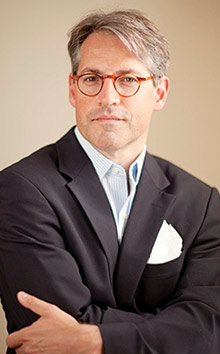"Christians need to be much bolder..."
 Christian Union: The Magazine interviewed author and renowned speaker Eric Metaxas, Yale '84, on the subject of culture change for its Spring 2014 issue.
Christian Union: The Magazine interviewed author and renowned speaker Eric Metaxas, Yale '84, on the subject of culture change for its Spring 2014 issue.CU: Regarding culture change and your recent books, did you find a common denominator between William Wilberforce, Dietrich Bonhoeffer, or any of the other subjects in Seven Men: And the Secret of Their Greatness?
EM: These were all men who were "in the world, but not of it," who all seemed to understand how to bring their faith into the "real world," as it were, into all spheres, not just the religious sphere.
CU: How can Christians make a radical difference when it comes to influencing culture?
EM: We must strike a balance between being committed and devout members of the Church—the people of God—while understanding that part of that commitment and devotion means facing outward, wanting to affect the world outside the church; to bless those who don't speak our language or understand our thinking, but whom God loves nonetheless.
CU: You have been outspoken about eroding religious freedom in the United States. How are religious freedom and culture change related?
EM: If the voice of the Church can be muted, it will do tremendous damage to the culture and to human beings in the culture. It needn't be as dramatic as what happened during the Third Reich, but any steps toward secularization inevitably harm everyone, including secularists. To push people of faith out of the public square is to remove the lynchpin connecting liberty of every kind for all persons.
CU: In a recent speech, you talked about the default narrative regarding American history that is being taught at some of the nation's leading universities, including Yale. How can that change?
EM: Evangelicals and serious Christians in general need to be much bolder about proclaiming the truth. But they will not do that unless they themselves know that the Gospel really and truly is the answer to all of our woes. They must themselves know that if you care about the poor and the suffering you will want to bring God and His principles to them and to the world in which they live. If we are not so sure ourselves, we will never be able to stand against the powerful false narrative that is everywhere in our culture. The idea of America as a force for good can be overstated, for example, but for decades now it has been wildly and devastatingly understated and it has blunted our ability to be a hope to people around the world, who long for the freedoms we have. We must not forget that people in the Soviet gulag rejoiced when they heard that Ronald Reagan had spoken boldly for freedom and had called the Soviet Union an evil empire. He did not shrink from bold language and he gave the prisoners of that totalitarian tyranny hope. There are people—many of them Christians—suffering horrors in North Korea, for example. Why does the Church in America remain silent, as though we have nothing to offer them? Their suffering should drive us to anger and action on their behalf. Do we think the atheists will be moved to help them?
CU: What will it take for modern day Bonhoeffers and Wilberforces to emerge from these schools?
EM: Whatever it will take, it will have to come from precincts other than the schools themselves. It will take students really knowing history—not the hamstrung historical narratives being put forward in academia these days, but the real thing. It will take being able to withstand a little criticism if they attempt to do what God has called them to do. If young people want to be liked by everyone, they will not only not be Bonhoeffers and Wilberforces, they will effectively be selling their birth rights for a mess of pottage. God has not given us all of the privileges and advantages and blessings we have for ourselves. We are meant to use them for others. That will cost us many things, including popularity with some people, but we should rejoice as we pay whatever it costs, knowing that God's opinion is the only one that matters.
Eric Metaxas is the author of several books, including the New York Times' bestseller Bonhoeffer: Pastor, Martyr, Prophet, Spy; Amazing Grace: William Wilberforce and the Heroic Campaign to End Slavery; and Seven Men: And the Secret of Their Greatness.





